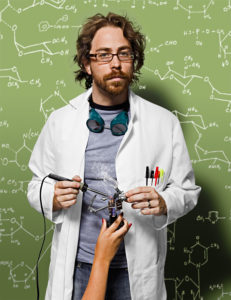 Hardly on hiatus, musician Jonathan Coulton has hosted a fan cruise, continued his role as co-host of NPR’s puzzle game Ask Me Another with Ophira Eisenberg, and cooked up the idea for a concept album since the release of 2011’s Artificial Heart. Said concept album, Solid State, is about to arrive, complete with a multitude of versions including one with an accompanying graphic novel written by Matt Fraction (Hawkeye, Satellite Sam) and illustrated by Albert Monteys. Popdose spoke with Coulton about these, the humorous nature of his early work, the sadder center of those songs, and a pervasive disillusionment with the promises of Internet culture.
Hardly on hiatus, musician Jonathan Coulton has hosted a fan cruise, continued his role as co-host of NPR’s puzzle game Ask Me Another with Ophira Eisenberg, and cooked up the idea for a concept album since the release of 2011’s Artificial Heart. Said concept album, Solid State, is about to arrive, complete with a multitude of versions including one with an accompanying graphic novel written by Matt Fraction (Hawkeye, Satellite Sam) and illustrated by Albert Monteys. Popdose spoke with Coulton about these, the humorous nature of his early work, the sadder center of those songs, and a pervasive disillusionment with the promises of Internet culture.
The new album’s called Solid State. It’s a song-cycle, and you even got Matt Fraction to write a graphic novel to go with it. Are you going all prog rock on us?
(Laughs.) Yes! Yes, I am, I’m sorry to say! I can’t tell you the mixed emotions I felt as I realized, in the course of writing this album, that I was writing a concept album about the Internet and artificial intelligence, and the future of humanity. That’s not what I had set out to do, but it definitely feels like…who do I think I am? But here we are, and I gotta say I’m grateful that Matt was able to take the sprawling, not-very-specific story outline I had and turn it into a cohesive narrative with details and characters that make sense, and still bring out the emotional content that I was hoping was there.
I’m happy with how it all turned out, but I also recognize how ridiculous it is to have a proggy concept album in this day and age.
 You seem to have a thematic aspect to every project you’ve done, in one way or another, certainly through the Song A Week but even in Artificial Heart. When you started writing this album, what was the impetus? What was going on?
You seem to have a thematic aspect to every project you’ve done, in one way or another, certainly through the Song A Week but even in Artificial Heart. When you started writing this album, what was the impetus? What was going on?
Every time I start an album I think, well, I need to write some songs, I guess. When I started this one I was feeling a little stuck, a little tired of my own songwriting bag of tricks.
So I worked a little differently. Usually when I write, I write on guitar, and I did a little of that on this album…but I tried to write in other places, on the piano, on the computer. I spent a lot of hours installing audio plug-ins, twiddling knobs and making weird sounds and making weird loops, trying to use that as a place to find the kinds of ideas that grow into songs.
I discovered after I’d written a couple of songs that there really was a theme that seemed to emerge, which was the Internet kind of sucks now, which is weirdly off-brand for me. I wasn’t quite sure what to do with that, and I wasn’t exactly sure what I meant. But in general, I was feeling a kind of disillusionment with the promise of the Internet as it was in the early days when it felt like, this is it. Now we’re all connected, now we’re all together. Now we’re going to get to understand each other and share everything with each other and be better humans.
But, in fact what it did was it seems to have amplified us in all directions and, right now, it’s feeling like a kind of uncomfortable time to be on the Internet.
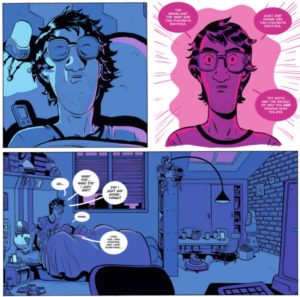 It was dealing with that since, especially for me, my career is kind of wrapped up in this idea — or at least the early part of my career was — because I couldn’t have made it in the regular record industry. It was only because of the Internet that I feel like I’ve been able to have a career, that I was able to take thins kind of niche-y songwriting that I was doing and find an audience for it and there were means by which that audience could support me without having a record label, without touring in the traditional way, without releasing product in the traditional way. That has changed too, and is also part of what I was struggling with when I started writing this record.
It was dealing with that since, especially for me, my career is kind of wrapped up in this idea — or at least the early part of my career was — because I couldn’t have made it in the regular record industry. It was only because of the Internet that I feel like I’ve been able to have a career, that I was able to take thins kind of niche-y songwriting that I was doing and find an audience for it and there were means by which that audience could support me without having a record label, without touring in the traditional way, without releasing product in the traditional way. That has changed too, and is also part of what I was struggling with when I started writing this record.
I kind of let it unfold from there, and this concept album about these heady, techno-cultural concepts is where we ended up.
I think a lot of people may know you from the earlier, more comedic-based, as you said niche material…and you’re looking to break away from that bag of tricks. Did you find during the writing of this that you wanted to do a song that was very pointedly humorous, darkly humorous, but pulled back rather than rely on those earlier songwriting tendencies?
There aren’t really any funny songs on this album, and that also was true for Artificial Heart. Lately I’ve been less interested in funny songs. But I will say that even my funny songs, many of them have a core of real sadness to them that you don’t always get the first time you hear them. With darkly humorous, you know, there is a kind of funny that I’m shooting for that, if you look at it too closely, you find that it’s heartbreaking.
I was describing this phenomenon with somebody, that with some of my songs, the first time you hear them, they read as funny. After you’ve heard them a while, they read as sad, and I can tell when I’m playing for an audience how new they are to my work. If they laugh, they’ve never heard it before. If they’re quiet, they’ve heard it a few times. It’s a weird phenomenon!
I didn’t really set out to do one thing or another. I just wrote where I was wanting to write, and I just went where the interest took me, and this is where we came out. I feel this is a serious record but I wouldn’t describe it as me trying to break away from something. This is just where I’m at right now.
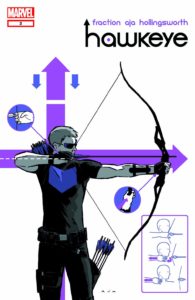 How did you get connected with comics writer Matt Fraction for the graphic novel?
How did you get connected with comics writer Matt Fraction for the graphic novel?
I was aware of his work and read his work with Marvel’s Hawkeye series. Some friends of mine were online and talking about his series Sex Criminals. I read that and was like, oh wow, this guy’s good. There were a couple of moments in Sex Criminals where, character-wise, one of the characters would say something, and it was a really simple phrase in a really simple moment, but it spoke volumes. It had a really deep, multilayered emotional content to it. That’s hard to do. That’s a real magic trick when you can give a character a small gesture or a small phrase and it says so much. That’s what really excited me about Matt’s work.
Matt and his wife Kelly Sue DeConnick (Bitch Planet) came on the JoCo Cruise, the annual fan cruise that I do. I perform, and we have a bunch of authors who come on, so they were there. I got to meet them and their kids, and I liked them a lot. That was right around when I was feeling like…maybe I should do a graphic novel. Matt felt like a good choice because I was confident that — you know, I wanted some of that juice! I wanted some of those moments for my characters! I felt like the outline and story idea I had was general enough that (one) it couldn’t stand alone without some details (and two) it really needed somebody who could see the emotional landscape that I was trying to create, and could build the scaffold to support it.
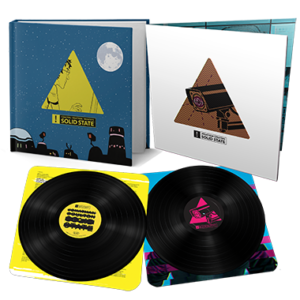 With the recording of Solid State, are you doing it as a band again as it was for Artificial Heart, or is it you recording everything, kind of as you said, a lot was about working computer plug-ins, getting new sounds, and using the computer as an instrument on its own.
With the recording of Solid State, are you doing it as a band again as it was for Artificial Heart, or is it you recording everything, kind of as you said, a lot was about working computer plug-ins, getting new sounds, and using the computer as an instrument on its own.
The process of recording this album was I worked with my producer Christian Cassan who has been my drummer for the past few years. He’s (a great musician who plays drums) and he also plays guitar, he plays bass, he’s terrific. He has great musical ideas. I worked with him in his studio and it was mostly me and him in a room, working on stuff together. Most of the instrument sounds were made either by him or by me with a few exceptions. We had a couple of guest musicians who played things we can’t play. Aimee Mann sang some backup vocals and harmonies on a few songs.
But mostly, just me and Christian in this room with this stewpot of sounds and ideas. It was really a long, languorous creative process, a slow-cooked meal. But I’m glad we did it that way! I’m very proud of it. It has a kind of…sonically, it has a kind of depth to it that feels like something I haven’t done before.
 You mentioned Aimee Mann is on Solid State. You played on her most current album Mental Illness. You were also a part of her Christmas show last year. I was asked to ask you, “Why didn’t you do ‘Chiron Beta Prime’ at that show and do you intend to do that at upcoming shows even though they’re not holiday related?”
You mentioned Aimee Mann is on Solid State. You played on her most current album Mental Illness. You were also a part of her Christmas show last year. I was asked to ask you, “Why didn’t you do ‘Chiron Beta Prime’ at that show and do you intend to do that at upcoming shows even though they’re not holiday related?”
(Laughing.) I don’t know! I had limited time onstage for Aimee’s Christmas show and I sort of had to pick and choose. And I have a couple of Christmas songs. This last show, I was there with John Roderick (from The Long Winters) and he and I wrote a Christmas album together (One Christmas At A Time). It was important to make sure we did some songs from that album.
I don’t know! I don’t have anything against that song. It was really just the luck of the draw with what you end up with. Once you get past a certain point, you can’t do all the songs all the time.
You’re also kind of the co-host for NPR’s radio game show Ask Me Another with Ophira Eisenberg. So what’s that gig like?
It’s great! We’re actually in Phoenix right now! We had an Ask Me show here last night and Penn Jillette was the guest. He was great, and that was a lot of fun.
 It’s a good gig. I like puzzles and games and trivia. I also like standing onstage and cracking jokes about stuff that happens. It’s a great job — it’s a nice bunch of people to work with. I really enjoy the chaos that happens when you have a couple of nervous contestants onstage trying to answer questions. I really enjoy the improvisational aspect of what Ophira and I do when we’re doing Ask Me Another.
It’s a good gig. I like puzzles and games and trivia. I also like standing onstage and cracking jokes about stuff that happens. It’s a great job — it’s a nice bunch of people to work with. I really enjoy the chaos that happens when you have a couple of nervous contestants onstage trying to answer questions. I really enjoy the improvisational aspect of what Ophira and I do when we’re doing Ask Me Another.
Plus you occasionally get to indulge your inner musical parodist every now and then!
Yeah, I get to do my “Weird Al Jr.”
Here’s another question I was asked to ask: How did you feel when (Yale University’s) Whiffenpoofs covered “RE: Your Brains”?
I mean, I was thrilled. It is a kind of satisfaction that I don’t think people would understand if they don’t know a cappella which, maybe, many people don’t have an emotional connection to a cappella the way I do. I have such fond memories of singing a cappella in college with the Whiffenpoofs. It can be really cheesy and cornball and silly, but there’s something wonderful — musically — about a group of people singing together. It’s a wonderful feeling and it’s a kind of camaraderie and a communication that happens onstage that’s sort of sub-verbal communion of mind that happens when you’re all singing together like that. It’s a really powerful experience.
So, yeah! When you’re in the a cappella community, The Whiffenpoofs is the closest thing you have to rock stars. I know that’s kind of a sad thing to say, but it’s true! And to be out of college for a few years and to find myself in this career as a musician and songwriter, then to hear that they did an arrangement of that song, is really gratifying! It’s like I’ve finally made it! (Laughs.)
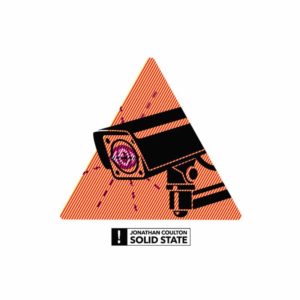 Let’s get back to Solid State. It’s coming in several formats. I think it is going to gain a lot of attention, not only for the music but because it has such a multimedia component to it. Could you walk through the extent of how Solid State is appearing for the public? And for those who aren’t familiar with your…oeuvre, to get all French about it…what is the major statement you’re making with this concept piece?
Let’s get back to Solid State. It’s coming in several formats. I think it is going to gain a lot of attention, not only for the music but because it has such a multimedia component to it. Could you walk through the extent of how Solid State is appearing for the public? And for those who aren’t familiar with your…oeuvre, to get all French about it…what is the major statement you’re making with this concept piece?
It is a kind of complex, multilayered project. One of the things I like about it is that the album stands on its own as an album. It’s not an explicit story being told, “rock opera” narrative. It’s not Tommy, but it holds together conceptually and there is a kind of story arc there but I’m not sure anyone would pick it out if it weren’t me. It’s possible to enjoy the album by itself.
The graphic novel tells a more specific version of the story that I think enhances the song in that way where…you know that experience where you hear a song and you think you know what the song is about, but you’re not quite sure? You would love to know what the songwriter meant when they wrote the song. In many ways, part of what the book does is say to the listener, “This is about this character, this is that moment that he sings about…”
It fleshes out the intentions.
Yeah! And it also, I think, to get to your other question, the message I’m trying to send which feels weirdly, sadly more relevant now then it was even when I started is that the Internet is this powerful tool that we haven’t yet figured out how to use. And, it’s connecting us and exposing us in all these ways and amplifying our best and worst tendencies.
Part of the message of this album is that technology itself is not going to save us and fix us. And in fact, we as humans have to continue working constantly on being better and better humans. If anything, the Internet is showing us where we fail to do that. I am hopeful that what’s happening now is: we’re going to look back and say that — this period of time — was a growing pain. That was a moment when the cultural change brought about by this technology overwhelmed us and we didn’t know how to control it, how to use it, and how to behave.
Jonathan Coulton’s Solid State is available for pre-sale at: https://www.jonathancoulton.com/2017/02/28/solid-state-pre-order-now/
Find out more about Jonathan Coulton at: https://www.jonathancoulton.com/bio/
Special thanks to Jonathan for taking the time to talk to Popdose.com, and Maddie Corbin, Grandstand Media & Management, for facilitating the interview.





Comments